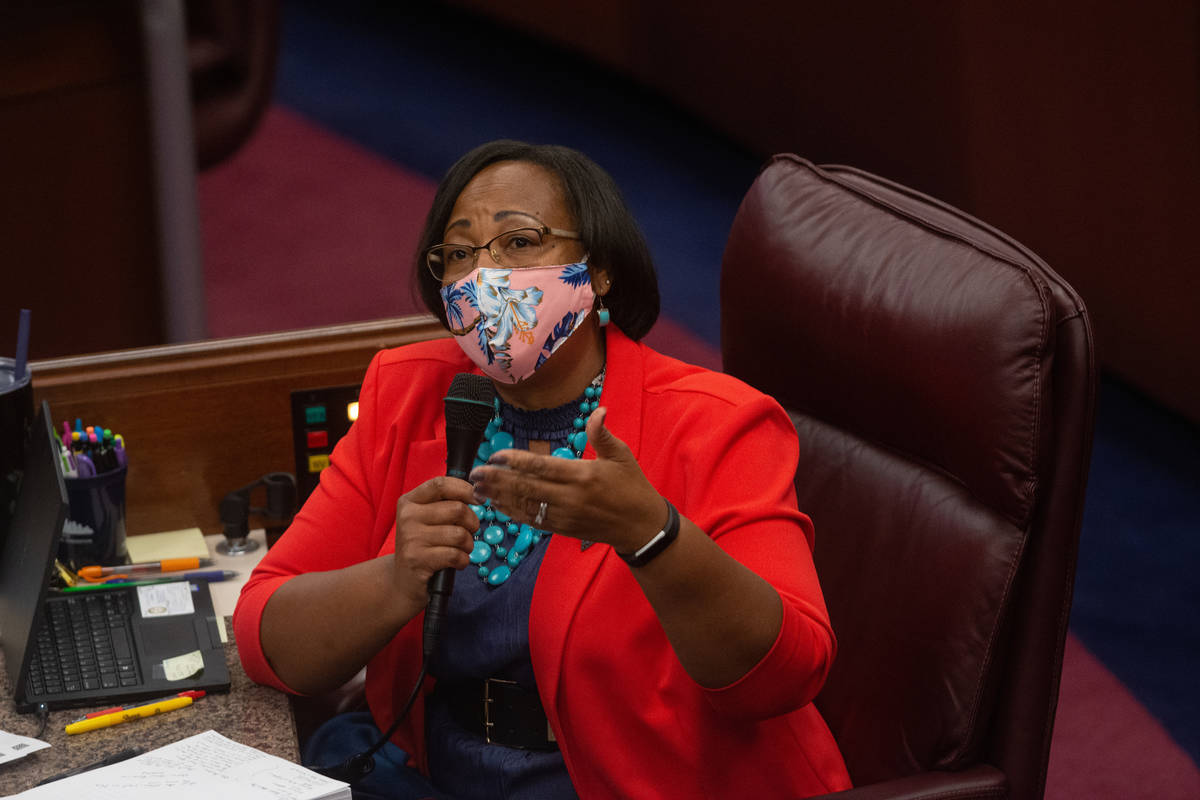Windfall lets state restore Medicaid cuts
CARSON CITY — With the state’s fiscal outlook dramatically improved, lawmakers on Wednesday restored more than $301 million in planned cuts to Medicaid enacted in a special session last summer at the height of the pandemic-caused financial crisis.
Those restorations, which await additional approvals and funding, topped Wednesday’s action in the Legislature, where committees in both houses also took up key legislation on gun control, no-knock warrants, banning racist mascots, and letting college athletes get paid for endorsements.
Lawmakers, facing what at the time was a $1.2 billion state budget hole, in July cut Medicaid reimbursements to medical service providers by 6 percent, in turn triggering a reduction in federal funds for the state’s Medicaid program. New revenue projections approved last week showed the state in line to take in nearly $600 million more than expected over the next two years, giving legislative budget writers leave to restore the cuts.
“We did some good work here today, so we can all leave and not have the tears I normally have at the end of our budget meetings,” said Assemblywoman Daniele Monroe-Moreno, D-North Las Vegas, the chair of legislative joint subcommittee on Human Services, after the subcommittee restored the funds.
Gov. Steve Sisolak applauded the move, saying in a statement that the cuts “no longer appear necessary.” The restored funds amount to $125 million in the current fiscal year that ends June 30 and $176 million in the two-year budget cycle that starts July 1.
“Medical providers have been on the front lines of the pandemic for more than a year, enduring untold stress, both financial and emotional,” the governor said. “Restoring provider reimbursement rate cuts will help these small businesses and hospitals that have done so much to keep hard-working Nevadans healthy during this pandemic.”
More than 800,000 Nevadans rely on these Medicaid services, the governor’s office noted.
Representatives from hospitals, physicians and insurers offered their own praise as the subcommittee concluded its work.
“This is a great day,” said Bill Welch, chairman and CEO of the Nevada Hospital Association. “Hospital and health care workers faced unimaginable circumstances over the last 15 months and Nevada faced an unprecedented state budget crisis as a result of the recent pandemic.”
Bills move out of committees
With Friday the deadline for remaining bills to pass their second committee hearing or die for the year, lawmakers acted on dozens of bills Wednesday, including Assembly Bill 286, which would ban the sale and possession of firearm frames or receivers sold as kits or made with 3D printers, so-called ghost guns. The measure passed out of the Senate Judiciary Committee on a 4-3 party-line vote, with Republicans in opposition.
Other bills passing out of committee:
■ Senate Bill 311, authorizing the state Rural Housing Authority to create a for-profit entity to spur more affordable housing.
■ Assembly Bill 308, changing the rules on rental late fees and rent increase notices to tenants.
■ Assembly Joint Resolution 10 of the 2019 session, proposing a constitutional amendment to raise the state minimum wage to $12 an hour if approved by voters.
■ Senate Bill 50, restricting the issuance and use of no-knock warrants.
■ Assembly Bill 158, reducing the penalties for underage use and possession of alcohol and marijuana.
■ Assembly Bill 88, which bans racially discriminatory school mascots and geographic place names.
■ Assembly Bill 254, which would allow college athletes to be paid for advertising and endorsements.
■ Senate Bill 293, which tackles gender pay gaps by banning employers from reviewing a job candidate’s previous pay history to determine salary.
■ Senate Bill 103, prohibiting insurers from discriminating on premiums and policies based on certain dog breeds.
■ Assembly Bill 67, which makes changes related to student suspensions and expulsions.
■ Assembly Bill 109, which increases the teacher licensing threshold for charter schools.
■ Senate Bill 275, which would treat HIV like other communicable diseases and repeal an outdated law that makes it a felony for an HIV-positive person to knowingly act “in a manner intended to transmit the disease,” reducing it to a misdemeanor.
■ Assembly Bill 403, which decriminalizes jaywalking and provides for a civil penalty up to $100.
■ Senate Bill 430, which broadens the scope of projects that can be financed by a special state infrastructure fund, including affordable housing and rural broadband access.
Contact Capital Bureau reporter Bill Dentzer at bdentzer@reviewjournal.com. Follow @DentzerNews on Twitter.














